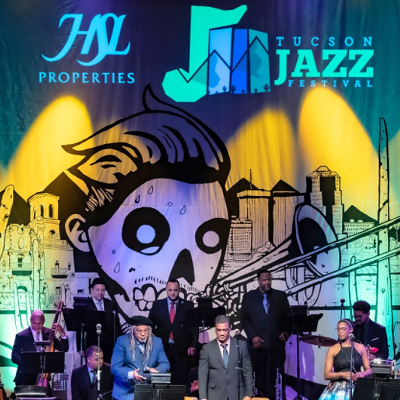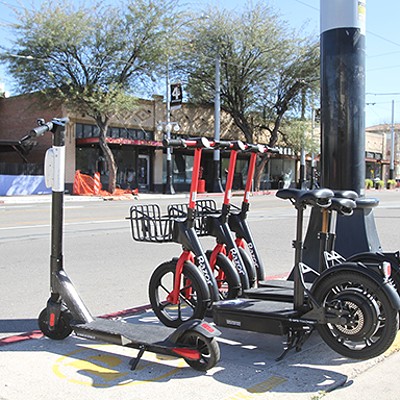The partnership was founded 15 years ago to coordinate the development of a downtown arts district, and today, the area boasts more than 300 artists' studios along with numerous galleries. The organization's successes also include nourishing the warehouse artist enclave near the railroad tracks, managing the once-popular Downtown Saturday Night event, operating a revolving loan fund to encourage building renovation and holding regular art walks and a semi-annual open studio tour to encourage people to visit the district.
Over the past few years, however, like many other non-governmental agencies, the partnership's annual funding from the city of Tucson was reduced to the current $165,810, its staff cut to three people from a high of seven. At the same time, city paperwork requirements on the group increased tremendously.
Concurrently, because of the slow economy, the partnership's private fund-raising efforts proved mostly unsuccessful. As a result, by February, the organization had cash-flow problems and was staring at a $25,000 deficit. Based on that, the Board of Directors decided to change the nature of the partnership to an all-volunteer organization, while City Manager James Keene recommended the group's government funding be spent on other arts programs.
"It's been quite a challenge to work under the budget we've had," says Ellie Patterson, president of the partnership board. While stressing that all of the partnership's bills will be paid by the end of June, she adds--of the decision to reformat the agency--"It seems we'd solve one problem and another would emerge. So the board decided that maybe at this point, we'd look at closing down. They felt there were too many obstacles, and at another time and place, maybe it would be more successful."
Although she'll be out of a job by the end of June, Partnership Executive Director Vera Uyehara thinks there may be some advantages in what is happening.
"The partnership will be liberated from the city," she says. "There's been a difficult history with City Hall, and they may not see the vision in us that some people do." Uyehara points out that a recently published city brochure intended to highlight downtown Tucson didn't even mention the partnership.
That is only the latest in a long series of clashes between the organization and local government officials. For more than a decade, they fought over issues ranging from costly requirements placed by Tucson Water on the historic Toole Avenue warehouses to the partnership's revolving loan building improvement fund. The group's supporters accuse City Hall of trying to micromanage the organization while also disregarding it as officials focus instead on implementing the Rio Nuevo project.
Other difficulties became apparent. There was tension between Uyehara, who was hired 18 months ago, and some of the artists in the warehouse district. In addition, when confronted with the deficit, the Board of Directors chose to cut its ties with the city instead of asking for more time to raise the private donations necessary to financially stabilize the organization.
So, the Tucson Arts District Partnership will soon cease to exist as currently constituted. Despite that, Uyehara hopes the present office space can continue to be rented, and Patterson expects the volunteer group to seek additional financial support. They also stress that the partnership will maintain its nonprofit status and the license for Downtown Saturday Night and Urban Picnic--the organization's largest annual fund-raiser.
At the same time, warehouse district artist and property manager David Aguirre believes two other partnership programs might also survive: The Phantom Galley project--which places art in vacant downtown buildings--and the studio tour could be taken over by groups he leads.
Meanwhile, distribution of the partnership's former city funding remains uncertain, but Aguirre has some ideas.
"A good chunk of that money should go to help renovate the warehouses and improve Toole Avenue," Aguirre says. But, facing its own large deficit, the City Council might want to use it to help balance the municipal budget.
As the Tucson Arts District Partnership changes character, the Downtown Independent Merchants Association is forming. Having met a few times, members of the loosely affiliated group of restaurant owners and others are still trying to define the organization while moving forward with a publicity campaign.
"Downtown merchants can't wait for Rio Nuevo (to be implemented)" says Teresa Terry, from Scooter's Cafe in the La Placita complex. She, along with many other prospective members of the association, are new to downtown, but adds, "Rio Nuevo isn't downtown, as far as I'm concerned."
In addition to aggressively promoting the area, Terry and other business people indicate they want to have a voice in decisions concerning proposed traffic changes and other issues which affect them, but say they want to be positive in their approach.
"I see this as an exciting opportunity to make downtown a better place," Terry says, "not a way to sit around and bitch about our problems."
Adds Shana Oseran, long-time owner of the historic Hotel Congress, "This is a wonderful idea. I think it will be good for downtown."












